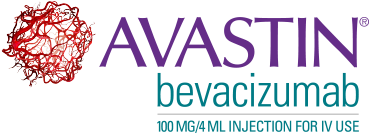Possible serious side effects
Everyone reacts differently to Avastin® (bevacizumab) therapy. So, it’s important to know what the side effects are. Although some people may have a life-threatening side effect, most do not. Your doctor will stop treatment if any serious side effects occur. Be sure to contact your health care team if there are any signs of these side effects.
Serious side effects (not common, but sometimes fatal):

A hole that develops in your stomach or intestine. Symptoms include pain in your abdomen, nausea, vomiting, constipation, or fever

A cut made during surgery can be slow to heal or may not fully heal. Avastin should not be used for at least 28 days before or after surgery and until surgical wounds are fully healed

This includes vomiting or coughing up blood; bleeding in the stomach, brain, or spinal cord; nosebleeds; and vaginal bleeding. If you recently coughed up blood or had serious bleeding, be sure to tell your doctor
What are the other possible serious side effects?
% = Percentage of patients who had this side effect in clinical studies across different cancers

Blood pressure that severely spikes or shows signs of affecting the brain. Blood pressure should be monitored every 2 to 3 weeks while on Avastin and after stopping treatment

These may include blood clots, mini-stroke, heart attack, chest pain, and your heart may become too weak to pump blood to other parts of your body (congestive heart failure). These can sometimes be fatal

These may be caused by too much protein in the urine and can sometimes be fatal

These were uncommon with the first dose (less than 3% of patients). 0.4% of patients had severe reactions. Infusion-related reactions include high blood pressure or severe high blood pressure that may lead to stroke, trouble breathing, decreased oxygen in red blood cells, serious allergic reactions, chest pain, headache, tremors, and excessive sweating. Your doctor or nurse will monitor you for signs of infusion-related reactions

This type of passage—known as a fistula—is an irregular connection from one part of the body to another and can sometimes be fatal

Signs include headache, seizure, high blood pressure, sluggishness, confusion, and blindness
Side effects seen most often
In clinical studies across different types of cancer, some patients experienced the following side effects:
- High blood pressure
- Too much protein in the urine
- Nosebleeds
- Bleeding
- Back pain
- Headache
- Taste change
- Dry skin
- Inflammation of the skin
- Inflammation of the nose
- Watery eyes
Avastin is not for everyone
Talk to your doctor if you are:

Avastin should not be used for 28 days before or after surgery and until surgical wounds are fully healed

Data have shown that Avastin may harm your unborn baby. Use birth control while on Avastin. If you stop Avastin, you should keep using birth control for 6 months before trying to become pregnant

Taking Avastin could cause a woman’s ovaries to stop working and may impair her ability to have children

Breastfeeding while on Avastin may harm your baby, therefore, women should not breastfeed during and for 6 months after taking Avastin
For more information about your treatment or condition, talk to your doctor.
What are the side effects of Avastin in nsNSCLC?
See the table below for select side effects that increased by 2% or more in patients who added Avastin to carboplatin and paclitaxel (chemotherapy).

What are the side effects of Avastin in mCRC?
See the tables below for select side effects that increased by 2% or more in patients who added Avastin to IV 5–FU–based chemotherapy.

What are the side effects of Avastin in mRCC?
See the table below for select side effects that increased by 2% or more in patients who added Avastin to interferon alfa.

*This included nosebleeds, coughing up blood, bleeding of the gums, bleeding in the small and large intestines, and bleeding in the brain, stomach, respiratory tract and skull.
What are the side effects of Avastin in first-line Stage III or IV ovarian cancer?
See the table below for select side effects that increased by 2% or more in patients who added Avastin to carboplatin and paclitaxel (chemotherapy) followed by Avastin alone or who added Avastin to carboplatin and paclitaxel (chemotherapy) followed by placebo compared to chemotherapy alone.

What are the side effects of Avastin in psOC?
In one study, the most common severe to life-threatening side effects that increased by 2% or more in people who received Avastin plus carboplatin and gemcitabine (chemotherapy) compared to those who received placebo plus chemotherapy or vice versa (refer to the last 2 rows of the table) were:

In a separate study, the most common severe to life-threatening side effects that increased by 2% or more in people who received Avastin plus carboplatin and paclitaxel (chemotherapy) compared to those who received chemotherapy were:

What are the side effects of Avastin in prOC?
The most common severe to life-threatening side effects that increased by 2% or more in people who received Avastin plus chemotherapy (compared with those receiving chemotherapy alone):

What are the side effects of Avastin in CC?


GET FINANCIAL SUPPORT
Questions about Avastin treatment costs? Let us help you understand your financial assistance options.

FIND OUT HOW AVASTIN IS DESIGNED TO WORK
Avastin is a tumor-starving therapy. Read more about how it's designed to work.

PATIENT RESOURCES
Find helpful information and support.
